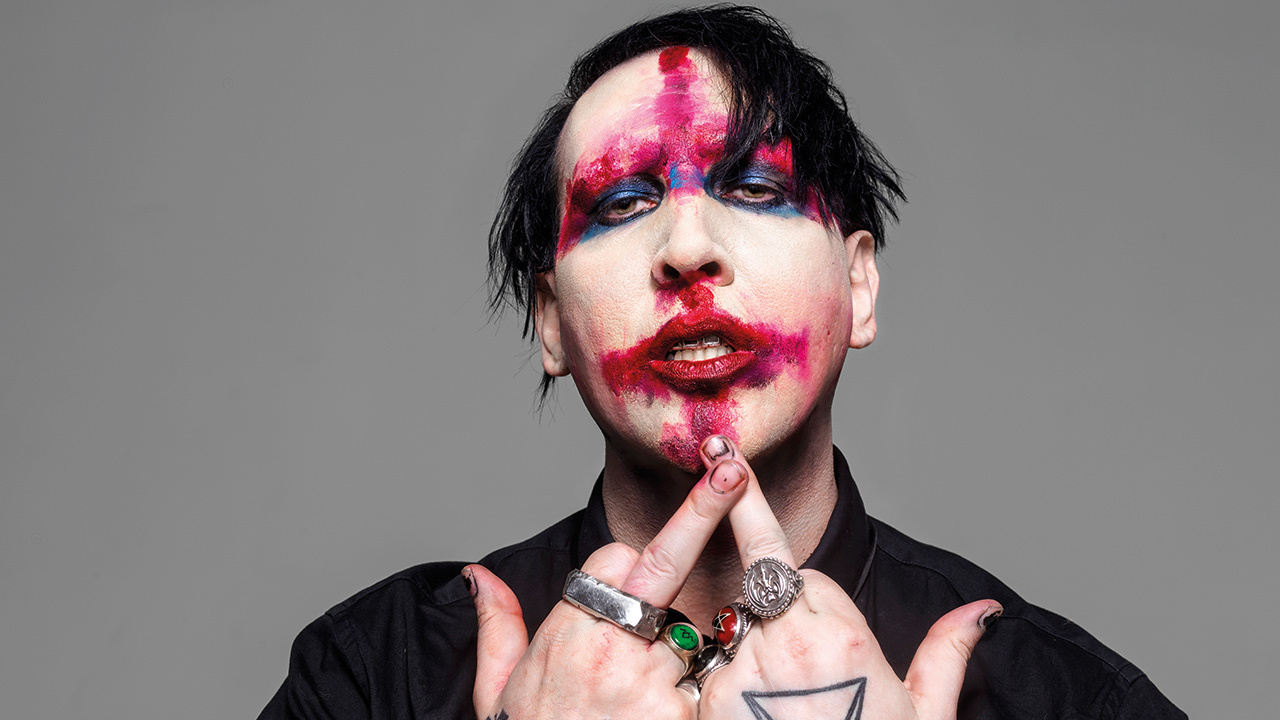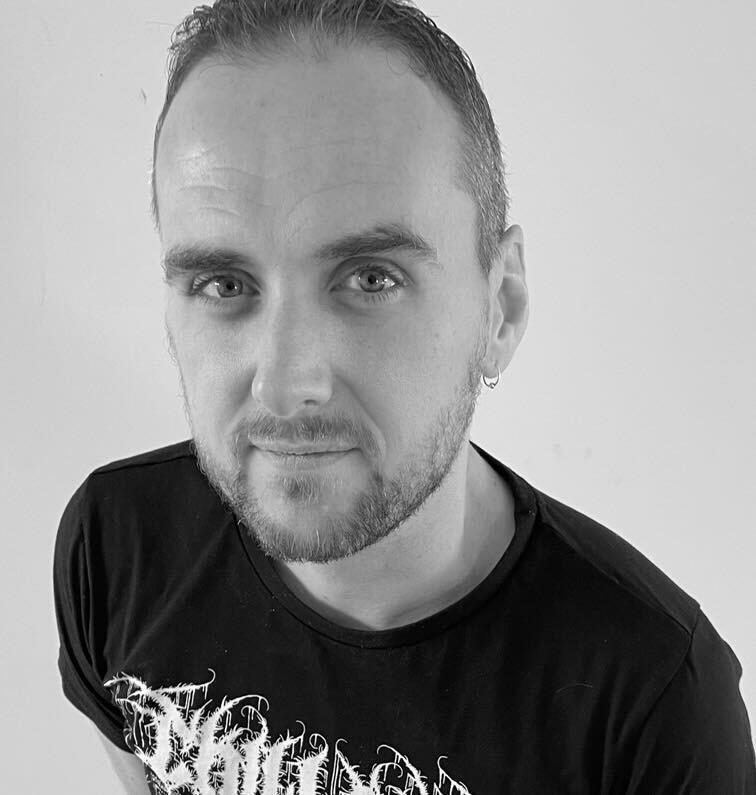Absinthe everywhere. White powder down our chins. A naked… something in the bed behind us. And Marilyn Manson, gurning like a maniac, his arm wrapped around our neck and his finger wrapped around the trigger of a pistol, currently pressed directly into Hammer’s temple. The pistol’s fake, of course. At least, we think it’s fake. Did we ask if it was fake? Oh, tits, please let it be fake…
Safe to say things have got a little out of hand pretty quickly, but then what else could you expect when you’re given the opportunity to spend a full hour in the company of one of rock’s few remaining, true enigmas? In a world of oh-look-here’s-Nergal-petting-a-llama-on-Instagram, access-all-areas rock stars, Marilyn Manson remains a riddle: a supervillain (or antihero?) come to life; a towering personality that transcends the man named Brian Warner who created it; a throwback to an era where metal was still terrorising the mainstream and you didn’t have to know what sized pumpkin spiced latte Rob Zombie plumped for this fucking morning.
So, as Hammer sits down on a huge leather couch in a dark and cold (but pretty damn lush) top-floor suite in Berlin’s Soho House complex, awaiting the man himself, there are just a few questions whizzing around our heads. Which Marilyn Manson are we going to get today? Is Heaven Upside Down another breakdown album? Are we imagining that naked shape spread over the bed in our peripheral vision? And is that inhumane pile of white powder on the giant coffee table beside us for show, or is shit about to hit the fan?
“That’s not cocaine, I swear.”
A rasping voice from the gloom in front of us makes us jump out of our skin, and suddenly, there he is: imposing, barrel-chested, white face, dark eyeshadow, staring a hole through us with a mischievous smirk that makes you feel like you’re the butt of a joke of which you haven’t heard the punchline. Dressed in a red and black pinstripe suit and cupping a very large tumbler of absinthe, Manson looks like the consummate host of a party plucked from Roald Dahl’s nightmares as he casually slumps on the sofa beside us.
“We’ve met before, right?” he gracefully offers. Actually, no, we haven’t. “Oh, sorry, right,” he shoots back, laying a friendly hand on our shoulder. “You didn’t realise, I was just hiding outside your house that time.”
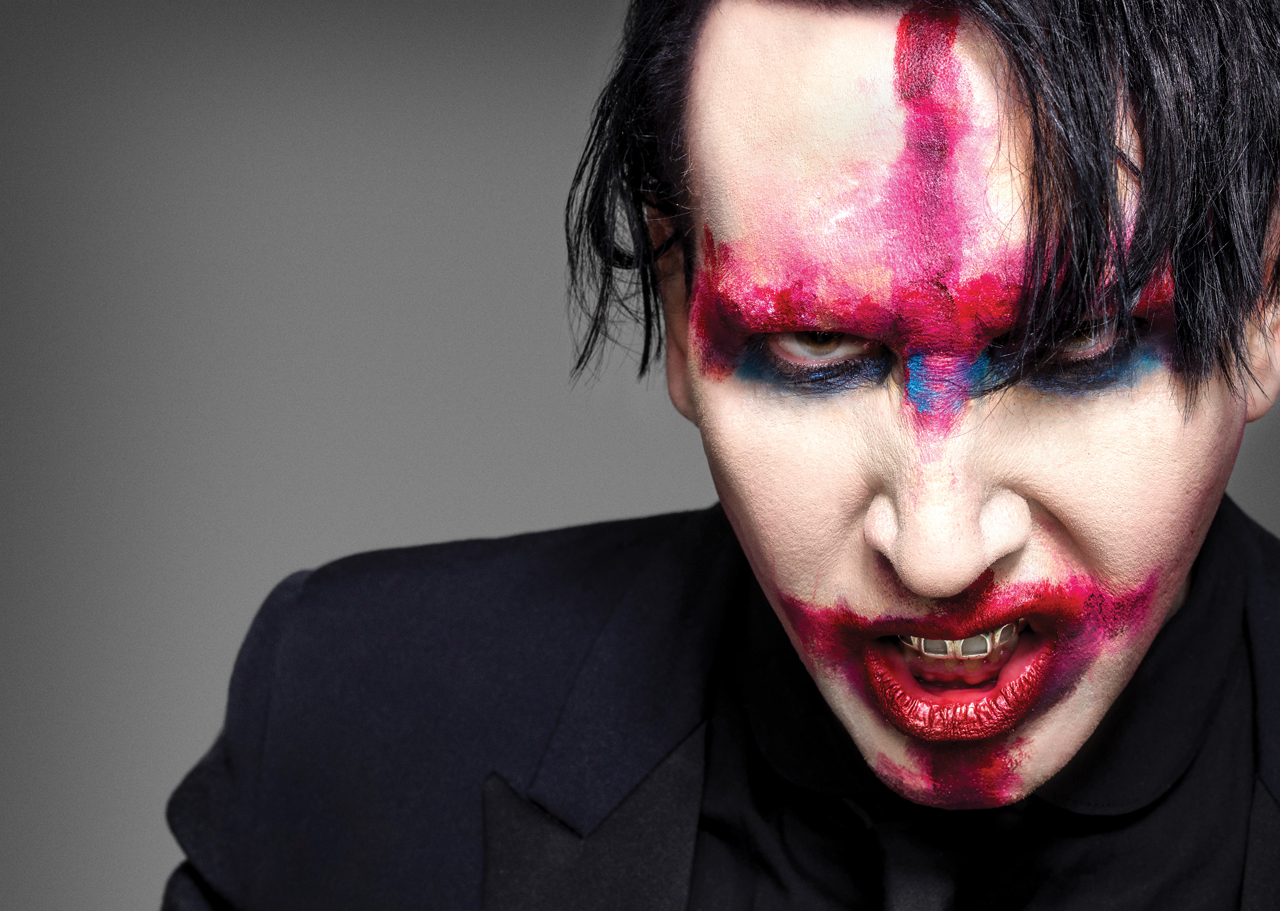
And we’re off. Even with Manson in a playful mood, it’s hard to know where to start. This is a man who has not only said and done it all, but in recent times has had enough ups and downs to give an eagle vertigo. In the last 10 years alone, he’s experienced career-threatening levels of critical annihilation (see his shambolic string of gigs from 2007-2012), Hollywood love-ins (bringing BFF Johnny Depp onstage at a gig in Hollywood in 2014 being a prime talking point), triumphant comebacks (2015’s excellent The Pale Emperor) and, on a more personal note, the loss of both his parents (most recently his father, who died earlier this year). Perhaps, then, we should begin with the basics: just how the fuck are you these days?
“I’m… good,” he considers in that bullet-gargling baritone, before adding, “I don’t like it when people ask me, ‘How are you feeling?’, because it sounds condescending. Somehow, I’ve avoided the whole ‘being my age’ thing. Through immortality, vampirism, whatever it is. So for me, the whole, ‘Hey, how are you feeling?’ thing…” he pauses, before flippantly waving away an imagined audience. “‘How are you feeling?’ Go fuck yourself.”
But people are concerned about Marilyn Manson in 2017. We don’t just want gossip and controversy, we actually care about your wellbeing…
“Look,” he sighs. “I’ve been to rehab, I’ve done this, I’ve done that, but I’m a professional. I’ve learned how to be a professional drug user and a professional musician. I wanna be the best at whatever I do. I had a couple of years where I said, ‘I’m not the best at what I’m doing’, and the last record – The Pale Emperor – was getting back to being the best, for me.”
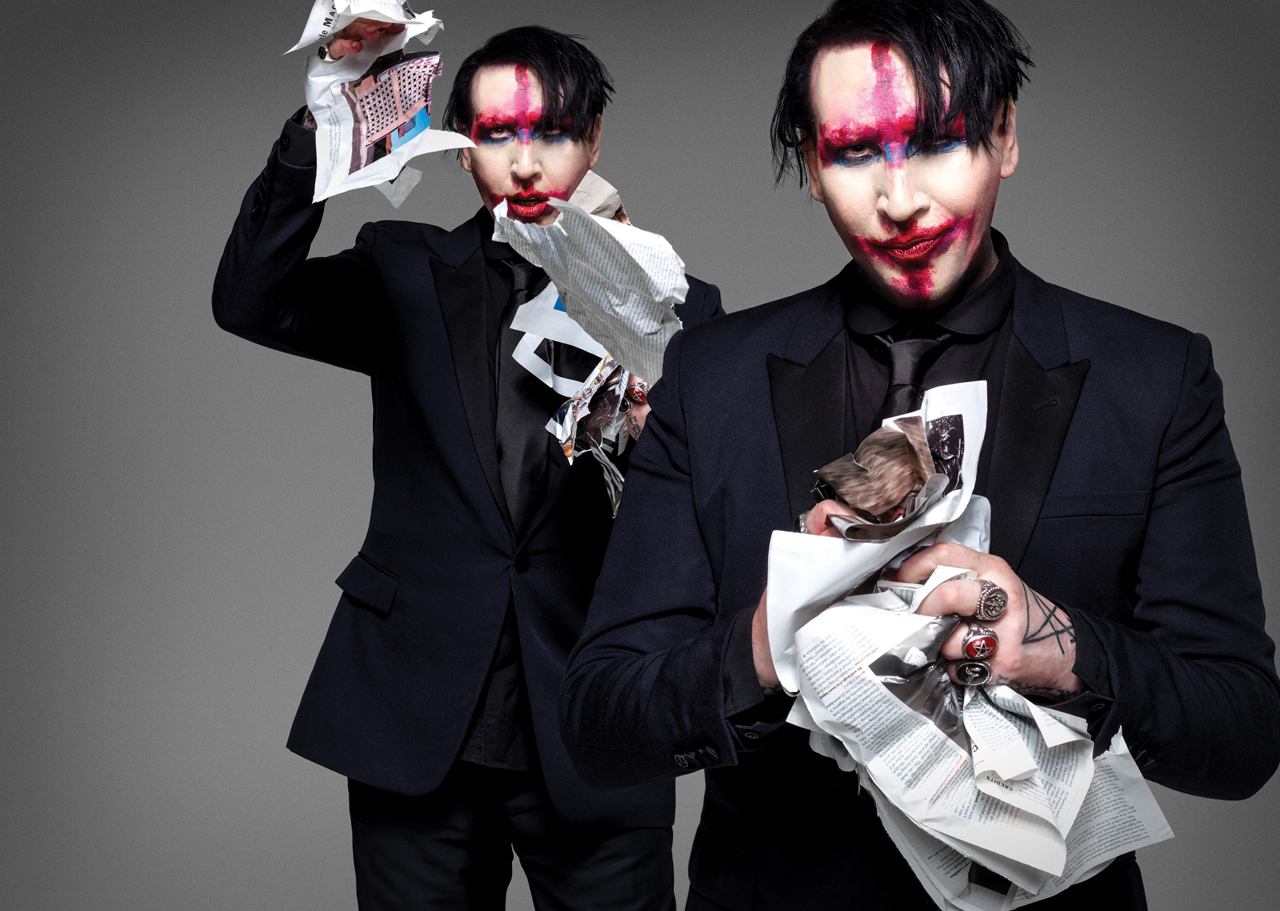
If it sounds like Manson isn’t quite answering our questions properly, it’s because he isn’t. Getting straight responses out of a mind like his is like catching frogs in a washing machine. While he’s perfectly lucid (if a little slurry at times – that tumbler emptying throughout the hour we spend together and his posture getting just a little more slumped), he doesn’t so much dodge questions as manipulate them to suit his own whim. He’ll send the conversation down a rabbit hole of his own making before throwing you off-guard with a witty observation, or switching the tone on you so fast you’re not sure whether he’s going to hug you or hit you.
Even despite that, he makes one very valid point here: The Pale Emperor wasn’t just getting back to his best, it was universally accepted as Manson’s strongest album in a decade. Teaming up with Hollywood blockbuster composer Tyler Bates – now officially a full-time bandmember and someone the frontman is evidently fond of – Manson ripped up his own blueprint, dialled back the intensity and produced a work steeped in bluesy sleaze and outlaw attitude. It was a fascinating left-turn that seemed to come up trumps. Which leads to the next question: why did he sack it all off for the throwback-heavy, punked-up rawness of Heaven Upside Down?
“Maybe I’m just trying to cause chaos,” he answers with a shrug and a smile. “But this is the story we wanted to make. It’s close, it’s personal, I feel good about it, I liked doing it, and it’s got layers to it. This record, to me, is more important than when I did Antichrist Superstar. I know this record is definitely… me. It’s not like any other record.”
- World exclusive Ozzy Osbourne interview in the new issue of Metal Hammer
- We put Corey Taylor and Randy Blythe in a room and asked them how they‘d save metal
- Slipknot’s Clown: We’re primed and ready to go
Explaining that they recorded it with him sitting on the sofa with a mic, while Tyler strummed guitar – “there was no vocal booth” – he evidently feels a deeply personal attachment to Heaven Upside Down. And so he should: it’s a very personal record. While his proclamation that it’s “not like any other” is a little off – there are callbacks to classic Manson all over the joint, far more than on The Pale Emperor – the gritty, punky vibe that permeates just about every crevice of the album feels urgent and raw. Lyrically, too, it feels like the God Of Fuck is baring his soul in a way not seen since Eat Me, Drink Me – ‘I’m unstable, I’m not a show horse’ he croons desperately on Tattooed In Reverse, before screaming, ‘You only want me when I’m upside down / I’m just being me’ on Blood Honey. Hell, even the album cover, depicting a stark, simple black and white portrait of Manson, screams ‘candid’.
“There is nothing ‘shocking’ anymore, but you know what is shocking?” he responds when we point all this out. “To do something poignant. To do something that says something without saying it. I’m not trying to make something that’s nihilistic or angry or hateful. I’m trying to make something that’s an open book. With all the shit that’s going on in the world, this record is not gonna change that, but it’s important, because people need something to grab onto when everything else is dogshit – oh, don’t mind her.”
Clearly, Manson has clocked our expression at a muffled, feminine groan coming from the bed behind us. We’re just not going to ask. You’ve mentioned previously that the tracks Heaven Upside Down and Saturnalia – both recorded as late additions – have defined this album. Why is that?
“The night that the song Saturnalia was written, it was the beginning of Saturn passing before the moon,” he replies. “I didn’t know my dad was as sick as he was, so I ended up going to Ohio, and he ended up dying the morning that Saturn finished passing over the moon. So it seemed very fated that that song really defined the record. And in no way is this a record about sadness or loss – it’s about whatever the listener wants it to be. I just thought it was very supernatural and strange that it all happened in that sequence.”
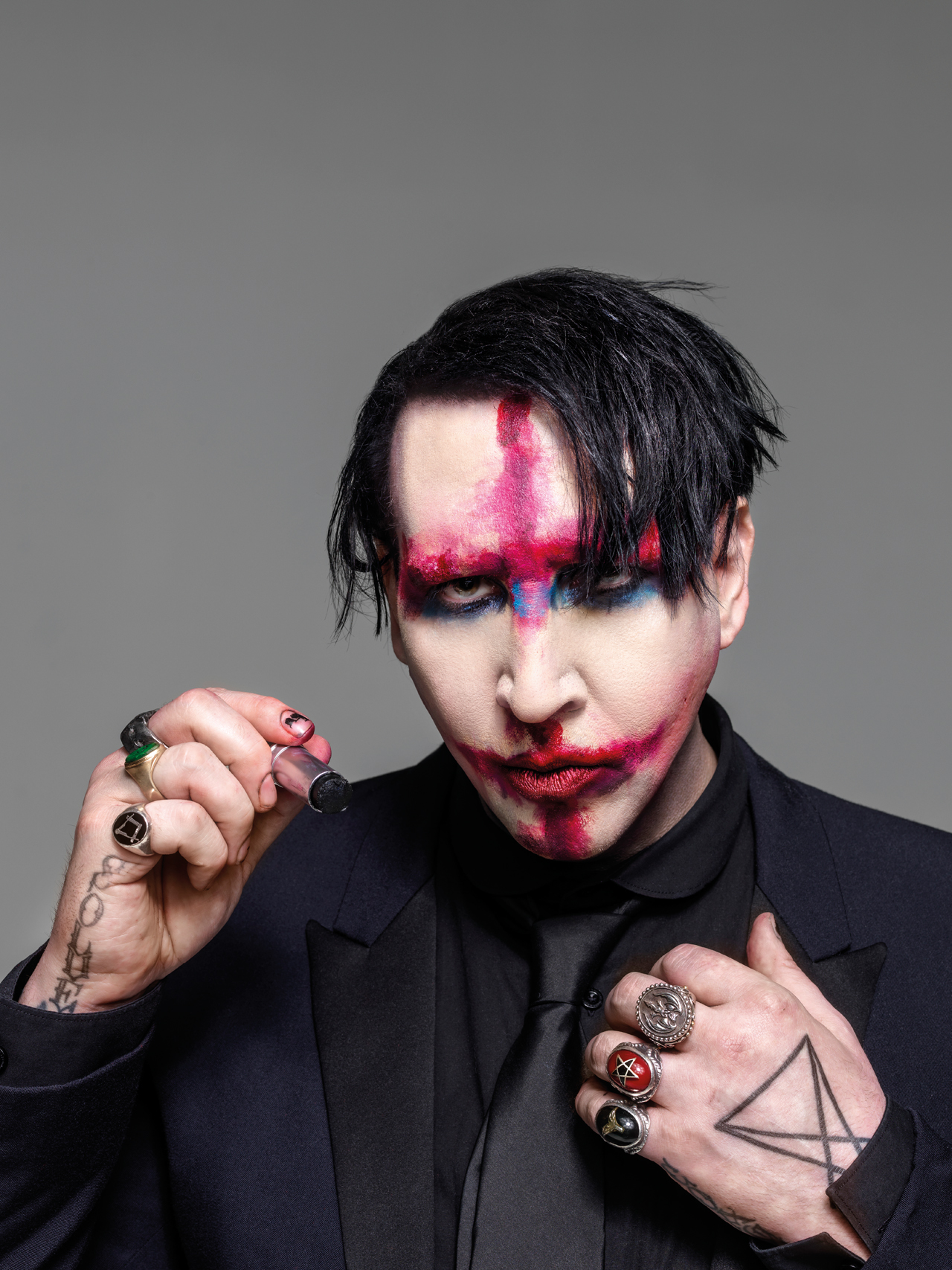
If Manson has been vague and playful in his answers so far, bringing his father up seems to suddenly shift things into a sharp focus. When Hugh Warner passed away in July, Manson posted a moving tribute to his father, noting: “He will always be the best dad in the world. Somehow and somewhere, I know he is with my mom now. I will keep my promise and never let you down.”
“We’ve always been close, and after my mother died, we became closer,” he notes today. “But I didn’t know the extent of how ill he was, because he kept it from me, so it was a little hard to deal with. But I was there with him at the end.”
There’s a brief pause, before Manson looks up, that air of mischief suddenly plastered back over his face.
“But he died with his hand on his dick.”
Wait, what?
“I couldn’t be in the room, because it was too difficult. But my aunt was there, and she [said] that when he died, he had his hand on his dick. Straight pimp. That’s my dad, and that’s what my dad would have wanted.”
Even in such emotionally raw territory, Manson’s ability to suddenly turn the mood on its head is little short of extraordinary. Over the next half hour of much breezier chatter, we discover that he hasn’t had a proper holiday in decades (“I don’t know how to take a vacation”); he thinks Rihanna is the most dangerous musician in the world today (“she gave me her phone number once”); he’s a big fan of the TV show The Young Pope starring Jude Law; and if we were coming over for dinner, he’d cook us a steak, “Hannibal style”. Any time the conversation floats back around the subject of his father, however – often by his own direction – he goes a little quieter. When we ask what his dad would have made of a record like Heaven Upside Down, there’s a pause. And a sigh.
“He would have wanted this record to be triumphant for me. And I never got to play it for him. He got to hear, like, four tracks of it. But I think that, instead of being negative or sad about it, I need to channel it into being something stronger. For this record, I had to be a man. I had to say [to myself], ‘Listen, this is how it has to be, because otherwise I’m not gonna fucking survive.’”
He pauses again, and if we weren’t so fazed by this latest unexpected turn of tone, we could have sworn we just saw the God Of Fuck wipe a tear from his face.
“And maybe that came from loss. It could be from loss, if I had to analyse myself… because you had to fucking make me do it. I could kick ya!” At this point, he punches Hammer on the arm and aims a kick in our direction. But it’s by no means threatening; it reads like a playful deflection from something that Manson seemingly hasn’t had much time to properly digest.
“This is the first interview I’ve done [talking about this],” he confirms. “So I haven’t really thought about it in my head. But you know what I’m saying.”
Has losing your father changed your perspective on loss? On death? On life, even?
“On time,” he replies slowly. “Time is short. You can’t fucking waste time fighting and arguing.”
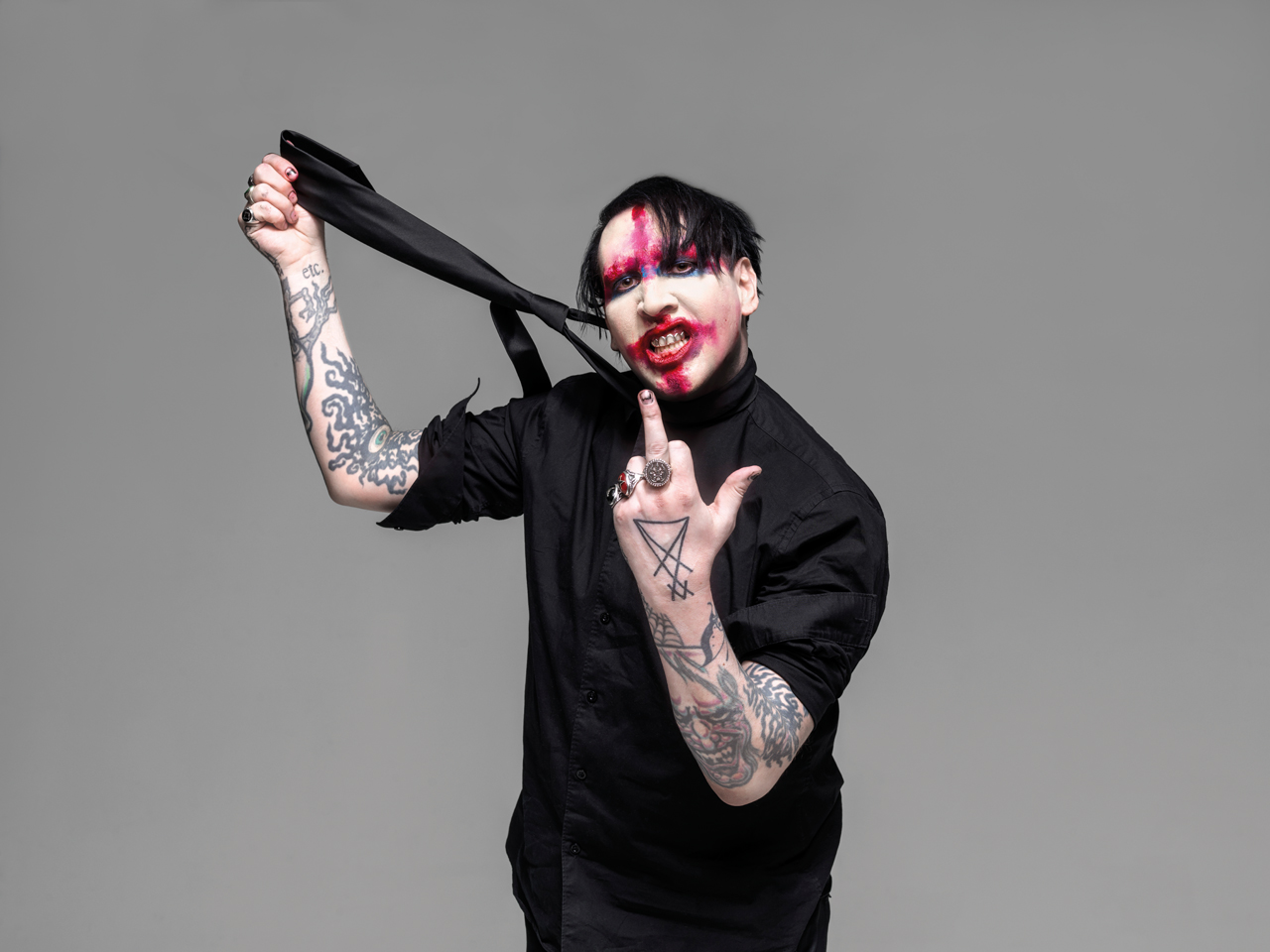
It’s hard to envision Manson as a man with many regrets. Hell, he’s so permanently in character that it must be hard for him to identify with that young, gawky kid called Brian in any meaningful way.
“I identify with him every day,” he argues. “Brian is just a word.”
And yet you must surely be running out of people in your life who still know you by it? Isn’t that dangerous?
“It doesn’t bother me what people call me now,” he insists. “It only annoyed me when people used to call me Brian as a way to pretend they knew me. Most people close to me didn’t call me that, and all the people that called me that are now all dead…” another pause, as the realisation of what he’s just said hits him.
“…that’s kinda fucked up.”
And it’s here that a tour manager suddenly walks in, tells us that our time is up and offers to take a photo of us together.
“A photo?” grins Manson, snapping right back into character. “Well, we have to make it really fucked up”. And then, he slams his glass down, pulls a gun from his pocket, grabs a fistful of white powder and shoves both right in Hammer’s face.
“So what happens if I pull the trigger?”
Thankfully, the gun was indeed fake, and, if our lack of brain-imploding buzz and suspiciously sugary-tasting fingers are anything to go by, so were the drugs. All part of the show that never ends: designed to keep you guessing until the end as the Great Curator continues to play the lead role in his own, fucked-up fantasy biopic.
“Oh, actually,” he adds by way of afterthought as Hammer is ushered out of the room. “It wakes me up.”
What wakes you up?
“Well, if I’m asleep, and someone says, ‘Manson, wake up!’ I don’t wake up. But if they say, ‘Brian!’, it wakes me up… I have no idea why.”
For all the confusion, trickery and left turns that an hour with the man will give you, it’s more than a little satisfying to find that Marilyn Manson is still very much a mystery to himself, too.
